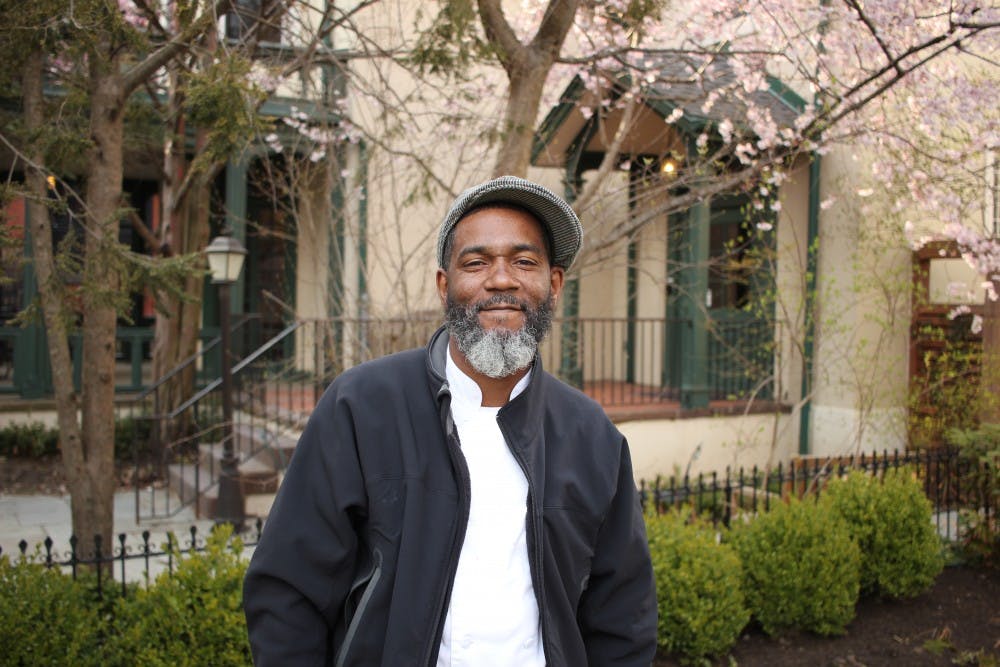Anyone who knows Hillel cook Troy Harris can speak to his infectious positive energy, an aura that is evident even upon first meeting him. After working at Hillel for over 17 years, Harris has become a well–known figure amongst Penn students and has a strong passion for his job, which he describes as a way to meet people “from all different walks of life” by starting a conversation with anyone and everyone who walks in the door.
When I arrived at Hillel last Saturday to interview him, he greeted me with a big smile and handshake and asked me how my day was going. No one, upon first glance, would guess that this man was going through a personal crisis.
The afternoon of February 15th normal as ever to Harris. On his way home from Hillel, he ran into his son, Azir, two blocks away from his house in South Philly. Azir told him he was going to go get something to eat, so Harris sent him off with some money for food and then went home to relax after a long day. Soon after walking through his front door he received a call saying that Azir, along with his two friends, had been shot.
“I just lost it, man, I really lost it,” Harris says.
He rushed out of his home to find Azir being lifted off the ground by medics, unresponsive. “It’s hard, it was hard to see,” he says. “It plays over and over in my head. Even though my son is still here with us, it plays over and over in my head. That moment, just that second.”
Azir was taken to Penn Presbyterian Medical Center to be treated and survived the shooting, but the effects of the event have had an enormous impact on his and the rest of the Harris family’s life. At just 17 years old, he is indefinitely confined to a wheelchair and has experienced more emotional injury than most people experience in a lifetime.
“That trauma took a lot out of my son,” Harris says, telling that Azir has been losing sleep for more than two weeks because of the nightmares he consistently endures. “It’s a road, man. I never thought I would live this. I’ve seen a lot of my friends get killed, a lot of my friends have been through tragedies, but I never thought it would really hit home.”
Azir and his two friends were planning on working for Harris’ entrepreneurial food truck business, Grassroots, during the upcoming summer. Grassroots, a project that has been five years in the making, was crafted by Harris and fellow Hillel worker, Kareem Wallace, with the intention of pulling at–risk youth in West Philadelphia off the streets and into the kitchen by employing a young cohort to help run a vegetarian food truck across the city. The project, which Harris hopes will inspire young people to get involved in the restaurant industry, was scheduled for kick–off in mid–May, but this start date has been effectively canceled given the circumstances. Instead of investing in his promising new business, Harris now has to find sufficient funding to cover Azir’s medical bills.
The cruel irony of it all, Harris tells me, is how the negative effects of living in his neighborhood, the same effects that he was trying to prevent with the Grassroots project, could come around to harm his own family and hinder the project from moving forward.
“They know how much tension is in the community,” Harris says of Azir and his friends, ”so any escape they were going to get, this was gonna give it to them,” he says. “Our food truck was gonna do on–the–road catering, so that was really saving them from not being in the neighborhood so much. They were really looking forward to that.”
Several members of the Penn community have reached out to help Harris and his family during this difficult time. Michelle Lyu (W ‘19) has been close to Harris ever since her freshman year. When he told her what had happened to Azir, she felt compelled to help and started an online fundraiser to help cover the costs of care and rehabilitation that Harris’ salary alone could not. Within just a week, the sum of more than 300 donations—many of which came from Penn professors and students—provided over $10,000 towards their $20,000 goal.
Harris’ hope for his son and for his family’s future has by no means dissipated. He is optimistic about Azir’s rehabilitation and is still inspired to pursue the Grassroots project to put an end to the cycle of violence within his community.
“Once you don’t have hope in yourself that’s when all hope is gone, so I have enough hope to take on the force that’s coming at me,” he says. “The clock don’t stop for nobody. The clock of life, the clock of doing anything. So I’m keeping up with the time.”

